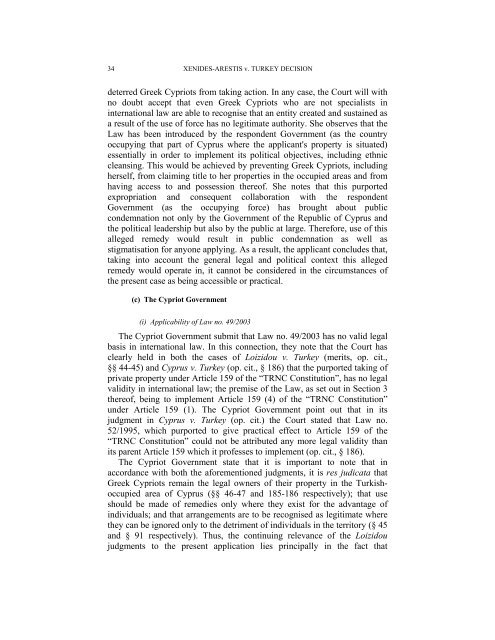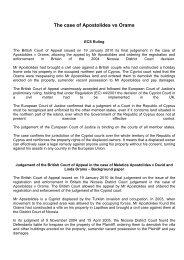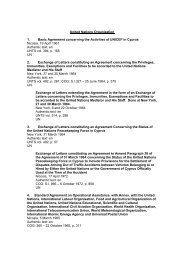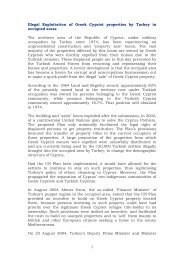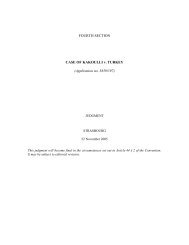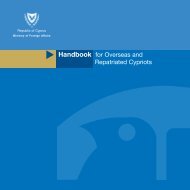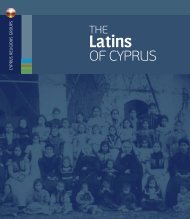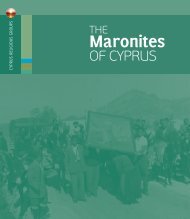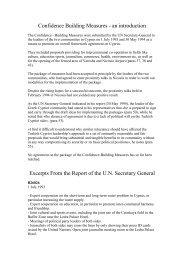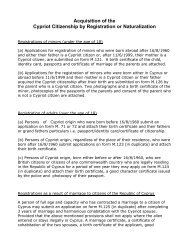Myra Xenides- Arestis v. Turkey
Myra Xenides- Arestis v. Turkey
Myra Xenides- Arestis v. Turkey
Create successful ePaper yourself
Turn your PDF publications into a flip-book with our unique Google optimized e-Paper software.
34 XENIDES-ARESTIS v. TURKEY DECISIONdeterred Greek Cypriots from taking action. In any case, the Court will withno doubt accept that even Greek Cypriots who are not specialists ininternational law are able to recognise that an entity created and sustained asa result of the use of force has no legitimate authority. She observes that theLaw has been introduced by the respondent Government (as the countryoccupying that part of Cyprus where the applicant's property is situated)essentially in order to implement its political objectives, including ethniccleansing. This would be achieved by preventing Greek Cypriots, includingherself, from claiming title to her properties in the occupied areas and fromhaving access to and possession thereof. She notes that this purportedexpropriation and consequent collaboration with the respondentGovernment (as the occupying force) has brought about publiccondemnation not only by the Government of the Republic of Cyprus andthe political leadership but also by the public at large. Therefore, use of thisalleged remedy would result in public condemnation as well asstigmatisation for anyone applying. As a result, the applicant concludes that,taking into account the general legal and political context this allegedremedy would operate in, it cannot be considered in the circumstances ofthe present case as being accessible or practical.(c) The Cypriot Government(i) Applicability of Law no. 49/2003The Cypriot Government submit that Law no. 49/2003 has no valid legalbasis in international law. In this connection, they note that the Court hasclearly held in both the cases of Loizidou v. <strong>Turkey</strong> (merits, op. cit.,§§ 44-45) and Cyprus v. <strong>Turkey</strong> (op. cit., § 186) that the purported taking ofprivate property under Article 159 of the “TRNC Constitution”, has no legalvalidity in international law; the premise of the Law, as set out in Section 3thereof, being to implement Article 159 (4) of the “TRNC Constitution”under Article 159 (1). The Cypriot Government point out that in itsjudgment in Cyprus v. <strong>Turkey</strong> (op. cit.) the Court stated that Law no.52/1995, which purported to give practical effect to Article 159 of the“TRNC Constitution” could not be attributed any more legal validity thanits parent Article 159 which it professes to implement (op. cit., § 186).The Cypriot Government state that it is important to note that inaccordance with both the aforementioned judgments, it is res judicata thatGreek Cypriots remain the legal owners of their property in the Turkishoccupiedarea of Cyprus (§§ 46-47 and 185-186 respectively); that useshould be made of remedies only where they exist for the advantage ofindividuals; and that arrangements are to be recognised as legitimate wherethey can be ignored only to the detriment of individuals in the territory (§ 45and § 91 respectively). Thus, the continuing relevance of the Loizidoujudgments to the present application lies principally in the fact that


